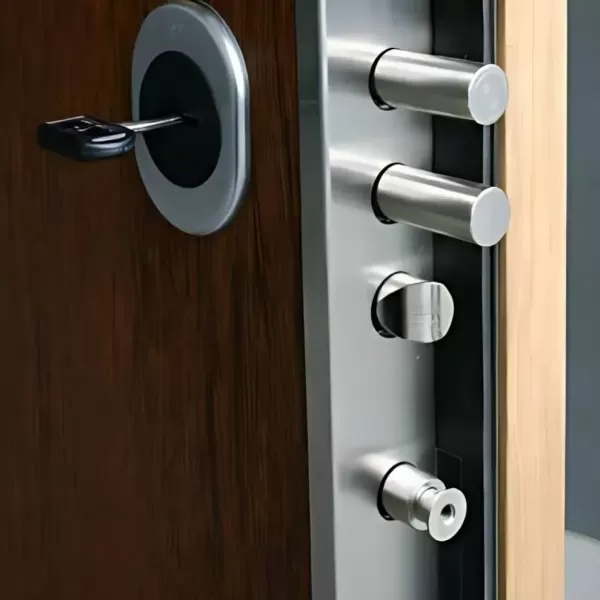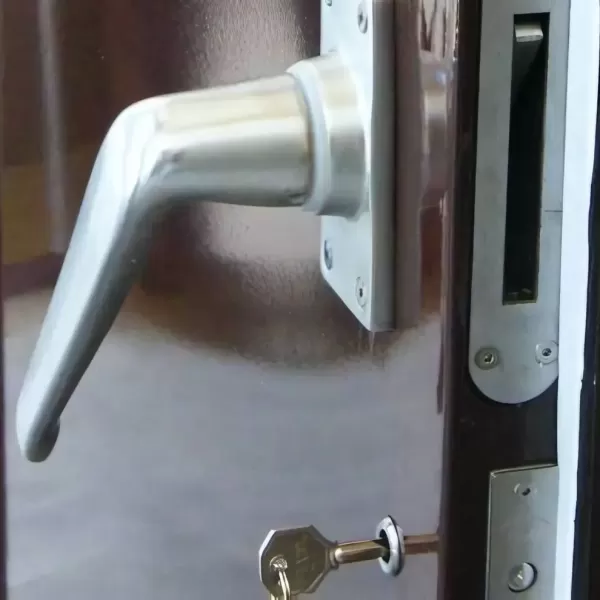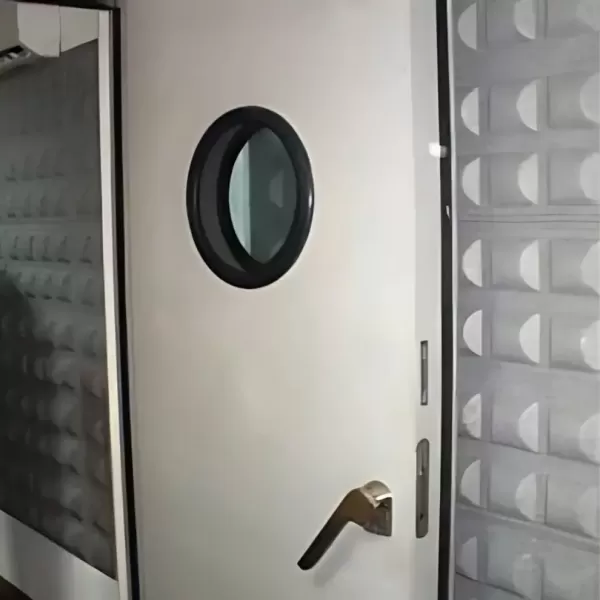Acoustic Doors
Creating a quiet, peaceful environment is essential for various settings, from recording studios to office spaces and industrial areas. Acoustic doors play a crucial role in managing sound transmission, ensuring that noise is effectively contained. At DECIBEL, we offer a comprehensive range of internal and external acoustic soundproof doors designed for maximum sound insulation and durability. Our different types of acoustic doors and custom acoustic doors are tailored to meet the specific needs of your space, providing an optimal balance of functionality and aesthetic appeal.
Importance of Acoustic Doors in Industrial Noise Control
In industrial settings, managing noise levels is crucial for maintaining a safe and productive environment. Excessive noise can lead to health issues, reduced productivity, and regulatory non-compliance. Our acoustic sound proof doors are engineered to provide superior noise control, ensuring that industrial operations do not adversely affect workers or the surrounding environment. By installing high-quality sound blocking acoustic doors, you can significantly reduce noise pollution, improving overall operational efficiency and worker well-being.
Noise Control Regulations
Noise control regulations vary across countries, but they generally aim to limit exposure to harmful noise levels in the workplace. For example, in the UK, the Control of Noise at Work Regulations 2005 mandates that employers take action to reduce noise exposure when it reaches a certain threshold. In the US, the Occupational Safety and Health Administration (OSHA) sets permissible exposure limits (PEL) to protect workers from harmful noise levels. Compliance with these regulations often requires the installation of soundproofing solutions, including acoustic doors, to ensure a safer and more compliant work environment.
Types of Acoustic Doors
PM 37 Acoustic Metallic Door
The PM 37 is a robust acoustic metallic door with a thickness of 44 mm. It includes a frame all around the edge, special profile sealant, and a mechanical system/mobile sill for the pavement area. The door has a tubular metal frame with bent sheet steel sheets of 1.5 mm thickness, filled with absorbent and dampening material. Ideal for technical rooms, machine compartments, and multipurpose areas requiring acoustic isolation. Sound insulation index Rw = 37 dB.
PM 42S Acoustic Metallic Door with Wood Finish
The PM 42S features an 80 mm thick acoustic metallic door with a wood finish and a frame all around the edge. It includes a safety lock with 7 closing points and 4 safety pins next to the hinges. This door is perfect for apartment or house entrances, offices, and other premises needing strong sound isolation. Sound insulation index Rw = 45 dB.
PM 43 Acoustic Metallic Door
The PM 43 is a 56 mm thick acoustic metallic door with a heavy core and two absorbent chambers filled with M0 classification fire material. It includes a self-opening system/manual closing, an aluminium wedge, and a double-seal special profile. Suitable for recording studios, cinema rooms, auditoriums, machine rooms, and various industrial premises requiring strong soundproofing. Sound insulation index Rw = 46 dB.
PM 43Re Acoustic Wood-Coated Door
The PM 43Re is a 64 mm thick acoustic door with wood-coated sheets and a double seal special profile next to the barrier. It features a heavy core and two absorbing chambers filled with absorbent and dampening material, a lock with an asymmetric European cylinder, and a proper system of latch tuning. This door is ideal for cabinet entrances, meeting rooms, medical clinics, classrooms, hotel rooms, and other areas needing acoustic isolation. Sound insulation index Rw = 46 dB.
PM 49 Acoustic Metallic Door
The PM 49 is an 85 mm thick acoustic metallic door with a heavy core and two absorbent chambers filled with M0 classification fire material. It includes a self-opening system/manual closing, an aluminium wedge, and a double-seal special profile. Perfect for recording studios, cinemas, auditoriums, machine rooms, and multiple industrial premises needing strong soundproofing. Sound insulation index Rw = 52 dB.
Expected Noise Reduction
The noise reduction provided by acoustic doors can vary depending on their construction and materials. Typically, you can expect a noise reduction index (Rw) ranging from 37 dB to 52 dB with our products. For example, the PM 37 Acoustic Metallic Door offers a Rw of 37 dB, while the PM 49 Acoustic Metallic Door provides a Rw of 52 dB. These reductions can significantly lower noise levels, creating quieter and more comfortable environments.
Enhancing Building Efficiency with Acoustic Doors
Acoustic doors play a vital role in enhancing building efficiency by improving the overall acoustic environment. By reducing noise pollution, these doors contribute to better communication, increased concentration, and a more pleasant atmosphere. Additionally, acoustic doors can help maintain energy efficiency by providing superior insulation, thus reducing heating and cooling costs.
Explore our range of acoustic doors at DECIBEL and find the perfect solution to enhance the acoustic quality of your space.
Frequently Asked Questions
An acoustic door is a specially designed door that reduces sound transmission between rooms. It uses materials and construction techniques that absorb and block sound to provide a quieter environment.
Solid core acoustic doors and timber acoustic doors are among the best for soundproofing due to their dense construction and ability to block sound effectively.
Yes, soundproof doors are highly effective at reducing noise transmission, making them ideal for environments where noise control is essential.
The cost of a soundproof door varies based on its size, material, and level of soundproofing required. Contact us for a detailed quote tailored to your specific needs.
Materials such as solid wood, metal, and specially designed acoustic glass are effective at blocking sound. Acoustic doors often use a combination of these materials to achieve optimal sound insulation.
Yes, adding acoustic panels to a door can enhance its soundproofing capabilities. This is a cost-effective way to improve noise reduction for existing doors.
Generally, thicker doors provide better soundproofing as they contain more material to absorb and block sound waves.




